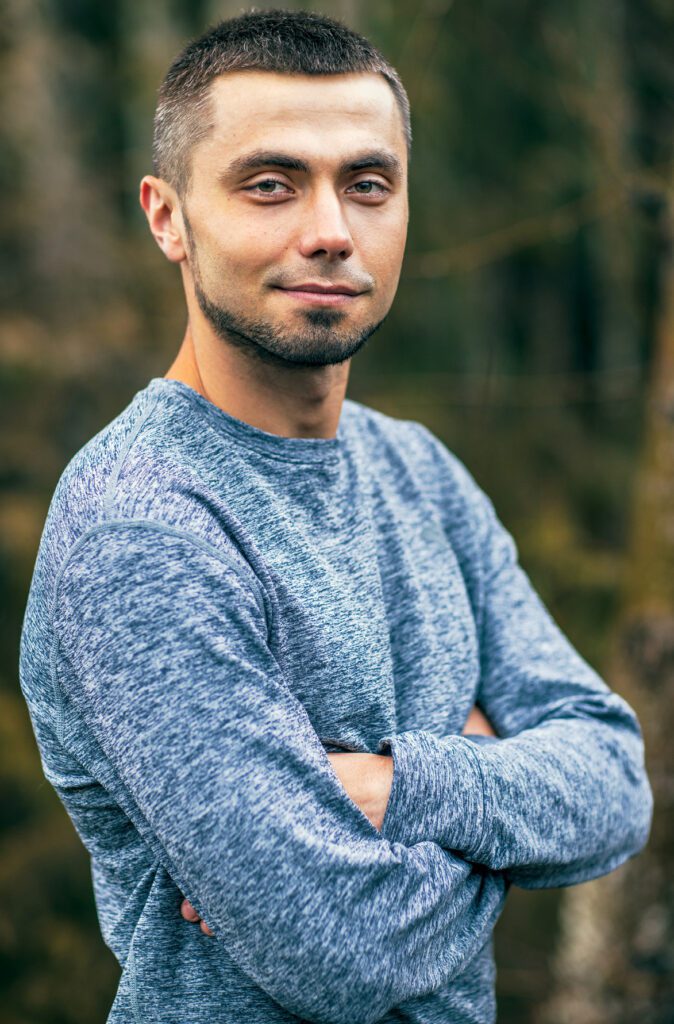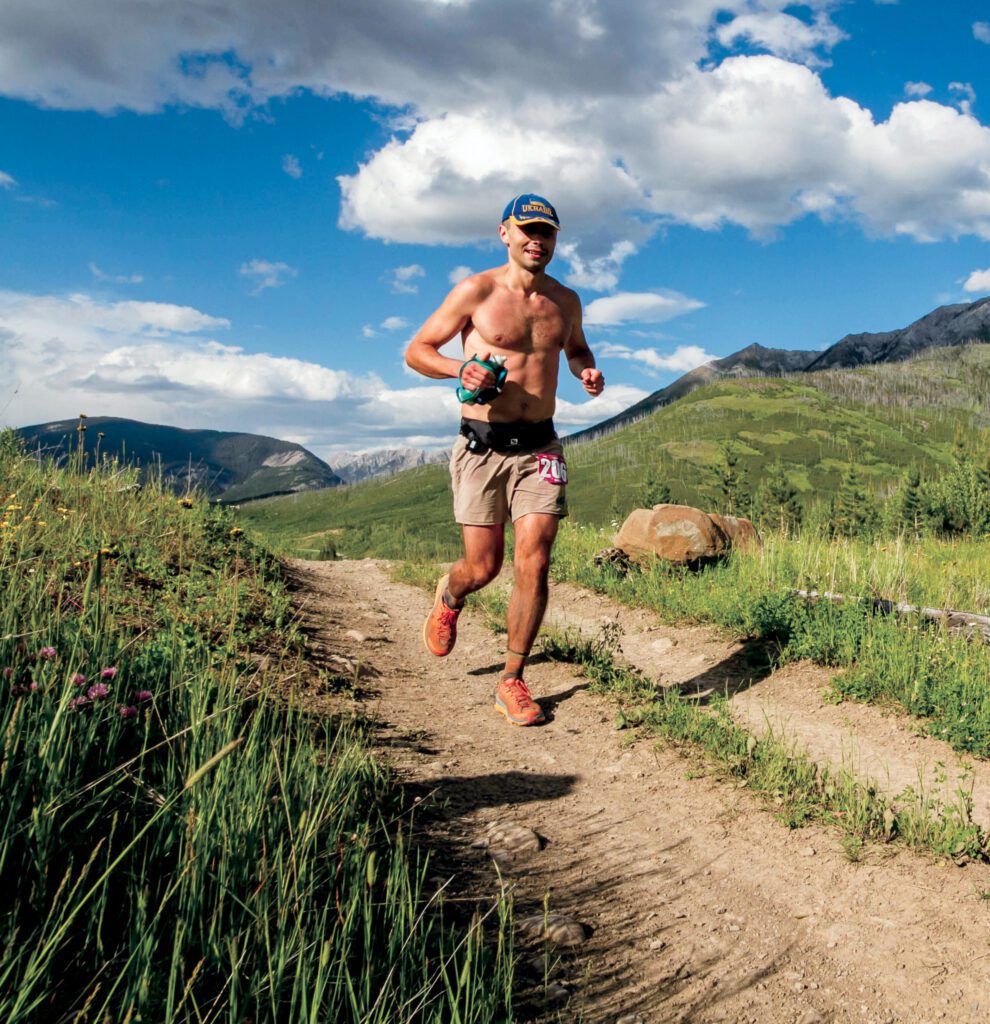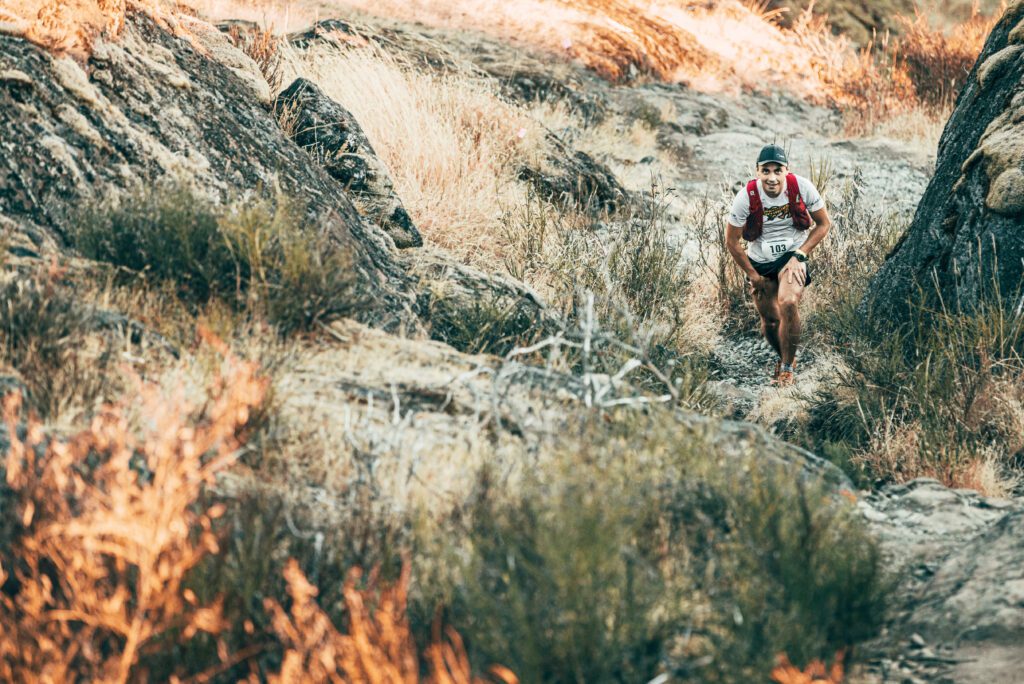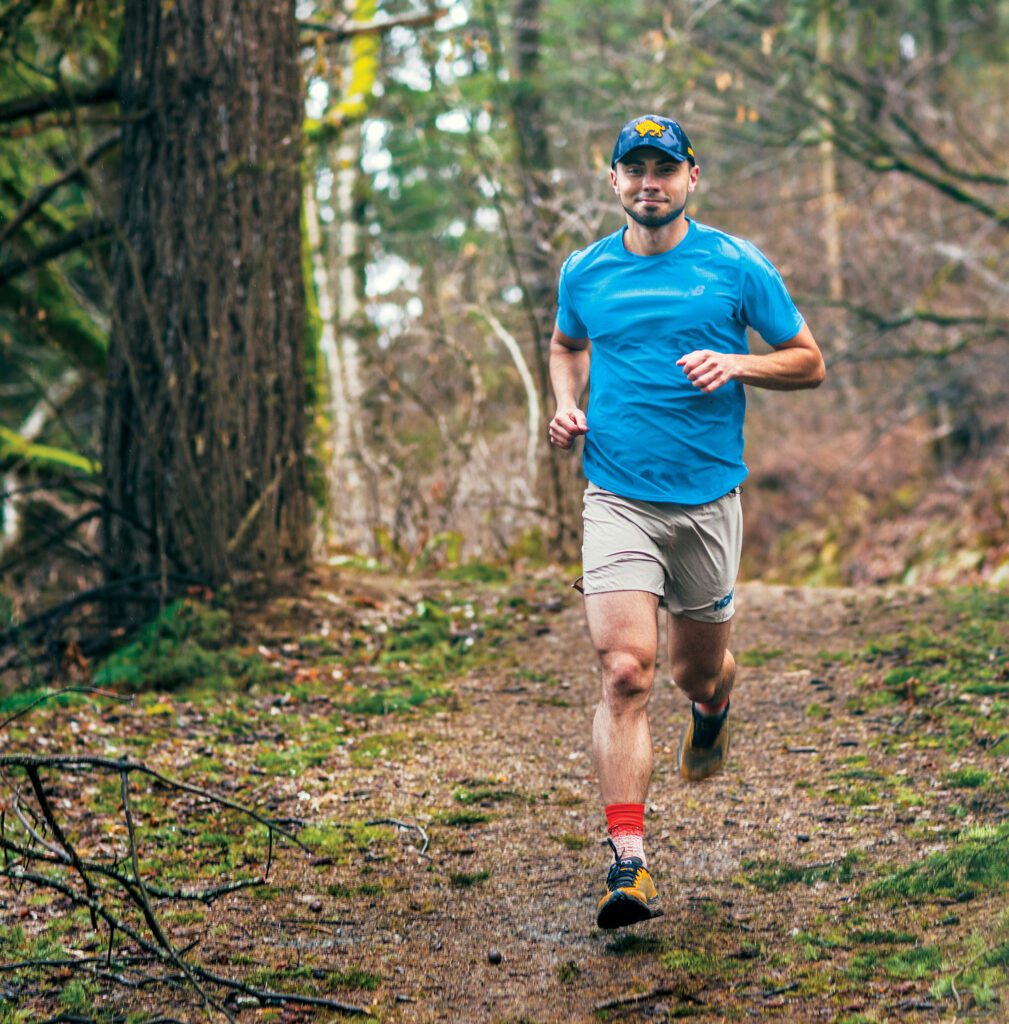In 2015, Ihor Verys of Chornomorsk, Ukraine, arrived in Manitoba on a student visa. He has never returned. Now, 29, and based in Chilliwack, B.C., he has taken up trail running, racking up victory after victory at some of Canada’s toughest races. Despite his success, he brings a humble self-awareness born of hardship, loss and gratitude
It’s May 2022 when I first met Verys. We are both running loops at the inaugural B.C. Backyard Ultra in Salmon Arm. Sporting a blue baseball cap with UKRAINE on it, the Chilliwack-based 28-year-old is smiling and friendly. Tall, with powerful legs, he runs with a metronomic gait, appearing completely relaxed even after 24 hours—the point at which I drop out, having achieved my goal of 100 miles. Other athletes, aware that the previous fall, he won the very challenging Finlayson Arm 100K on Vancouver Island—his first ultra—are clearly in awe of him.
Verys won again in Salmon Arm, with 39 “yards” (6.71-km loops, run every hour until only one person is left)—i.e., a total of almost 262 km over 39 hours. His win earned him a spot on the Canadian team competing at Big’s Backyard Ultra World Championship in October 2022, where he was the last Canadian standing, with 67 yards, or 449.57 km. Canada finished fourth, behind Belgium, Australia and Japan. (Ukraine had a team, something Verys was pleased to see; they finished 27th out of 37 nations.)

He’s won almost every race he’s entered since 2021, including (besides the B.C. Backyard Ultra and Finlayson Arm) the Sinister 7 100-miler in Blairmore, Alta. and Fat Dog 120-miler in Manning Park, B.C. And before entering any ultras, Verys completed a 125-km fastest-known-time (FKT) along the remote Mantario trail on the Manitoba/Ontario border, which Manitoba ultrarunner Kristian Andres refers to as “absolutely insane.”
Verys didn’t win at Whistler Alpine Meadows, a race he entered outside his season plan after receiving an invitation from race director Gary Robbins, who describes him as “incredibly talented and dedicated.” (He finished second.)
I am curious to learn what makes Verys tick, and where the connection lies between his youth in Ukraine and his ability to win ultra after ultra. A few months later, I’d get the opportunity to hear his story.
Verys grew up in the Ukrainian city of Chornomorsk, just south of Odesa, on the Black Sea. He describes his life as simple but happy; he and his friends played soccer and basketball, but he was never interested in running for its own sake before coming to Canada. His mother worked 12- to 14-hour days, seven days a week, as a school inspector, teacher and private tutor, to provide for him and his older brother (who now lives in Brandon, Man.). “My mom has always been my biggest inspiration,” says Verys. They didn’t own a car, and she walked him the three kilometres to and from school every weekday for the 10 years of his school life.
“In my university years, I ended up walking five kilometres each way for four years,” he says, adding that this is not unusual in Ukraine. While his mother could afford a car now, she continues to walk. “That’s her lifestyle,” Verys explains. “She always says, ‘Movement is life.’”
In retrospect, he says, his lifestyle in Ukraine was one big base training block, and what he drew on when he began his running career in Canada, in 2016—a year after arriving on a student visa in 2015, at age 20, to study at Assiniboine College in Brandon.

Becoming A Runner
Verys had never travelled outside Ukraine when he arrived in Canada; he had always wanted to see the world, and to learn English. “I fell in love with this country and its people,” he says. “I like the rules and high standards of this country, the respect people show to each other. I like when people are smiling when they run into each other, I like Canadian endless ‘thank yous,’ I like how Canada loves and promotes self-made people. This is the country of endless opportunities. You can be whoever and whatever you want here, and no one is going to stop you. This is also one of the most diverse, multinational countries in the world, and I love how everyone is living in peace here. I felt very comfortable in this society, and so I wanted to become a part of it.”
If his feelings about Canadians strike us as slightly idealized, it may be because it’s been several generations since we’ve experienced the deprivations of war. And while he is very happy to be here, it hasn’t always been easy. Verys took up running, he says, largely for mental health reasons: “I was by myself here, in a foreign country, facing many challenges. Running helped me to vent and keep my head clear. It was also the cheapest sport to get into.”
He entered a small, local 15K and won—though he says it’s only because it’s such an unusual distance that not many people signed up. It got him hooked on running, and he ran a few half-marathons over the next couple of years.
After graduating from college and working for a year, Verys qualified for a federal immigration program that allowed him to become a permanent resident. (He has been a Canadian citizen since January 2022.) In fall 2019, he dove into the marathon, taking on three in as many months, then a fourth three months later: Regina, Treherne [in Manitoba], Quebec City and Fort Lauderdale.
“Don’t ask me for results,” he laughs, implying they were not fast. “I was struggling through all of them, but that’s what pushed me to study and educate myself on how to be and do better. I knew nothing about training, diet, nutrition or strength training.”
Treherne, which is one of two Boston-qualifying marathons in Manitoba (the other is Winnipeg’s Manitoba Marathon), foreshadowed Verys’s transition to ultratrail: according to him, it doesn’t attract a lot of runners, because it is run on hilly, rural roads. This clearly worked to his advantage, since he won, in 3:36. “I really enjoyed the ‘vert’ aspect of the race,” he says, again displaying a disarming modesty about his achievement.
In 2020, Verys signed up for a 50K race that ended up being cancelled due to COVID-19. Naturally, the following year, he headed straight into the Finlayson Arm 100K. And won.

Perspective Born of Hardship
In speaking with Verys, I’m aware that his parents are still living in Ukraine, and I’m nervous about approaching the topic of the war. But he is keen to talk about it, his passion for his country evident.
Back in 2014, as a young university student (he has a bachelor’s degree in international relations, and once dreamed of becoming a diplomat), he participated in the Revolution of Dignity, protesting the government’s increasingly close ties with Russia and its rejection of a free-trade agreement with the European Union. One hundred and eight protesters died in the uprising, including one of his best friends, who was also a partner in a popular sports website. (Ultimately their political activities left no time to maintain the website, and they shut it down.) “I encourage everyone to keep supporting and helping Ukraine in this fight for independence and justice,” he says. “The truth is on our side.”
He is in touch with his parents every day, grateful that they are far from the fighting, and relatively safe. “Both of my parents can come and stay with me in Canada, but they choose to be in Ukraine, because it is their home,” he says. “They accept the risk, just to be in their houses, on their land.”
Verys, who now works for an insurance brokerage, assures me he is not indefatigable. “Oh yes, I definitely get sore and tired—there’s no way around it,” he says. But he has learned to expect fatigue. “At the end of the day, an ultra always becomes mental, no matter how strong physically you are. If ultras were easy, we wouldn’t be into this sport, would we?” I can hear the smile in his voice.
He likens his experience of ultras to a sine wave that gently but repeatedly rises and falls. “The longer you can ride the upper wave, the better, but you’ll definitely hit some lows,” he says. “You can do many things to get out of a low: downshift gears, increase hydration, throw in extra sugar, take a longer break at an aid station—you just have to remember there is always a high after a low.”
But it’s obvious his ability to keep his own suffering in perspective comes from a resolve that goes much deeper than his cheerful optimism would indicate. “I often think about all those boys and girls at the frontline whose lives are full of whistling bullets, blood, darkness and sleep deprivation,” he says. “In spite of that, they move forward and keep fighting. They are my big inspiration, and they definitely drive me to be stronger during my races when I need to overcome hardships.” He adds: “I believe that the desire to not give up under any circumstances and carry on is in my Ukrainian blood.”
Even the greatest ultrarunners have a DNF or two on their resumes; while Verys has won almost everything he has entered, I ask him if he’s ever considered dropping out. “I never thought about dropping out of a conventional 100-miler,” he says, “but some dark thoughts were definitely creeping up into my head at the backyard race, due to an ankle injury that was getting progressively worse.” He credits his crew and friends with pulling him out of a low spot. “Eventually, I forgot about the pain.”
Robbins points out the rarity of the mental toughness Verys has repeatedly demonstrated. “While the rest of us are suffering away out there and fighting an incessant internal battle just to keep our feet moving, Ihor seems to genuinely and almost naturally cherish the gift of being able to run at all,” he says. “The fact that he can apply that over continuous days on end, to never crack internally, is a unique trait that many spend their entire running careers attempting to sharpen.”

The backyard ultra gives rise to some mental challenges that are unique to the format—namely, the chance to sit down and rest for a few minutes before the next loop starts. Verys echoes something I’ve heard from other strong backyard athletes I know: that they would never make the decision to stop while resting between loops—the only acceptable way out is to fail to complete a loop before the one-hour cutoff. “In the backyard format, you must sharpen your mind to focus only on the current loop,” he says. “Once you start thinking about some hefty numbers you plan or hope to achieve, a backyard race will destroy you.” Verys adds some simple advice that has clearly worked for him: “Stay humble and grind, one loop at a time.”
Despite his success, Verys hasn’t looked for sponsors or made any attempt to turn pro. Granted, he hasn’t hit the world scene, but he has smashed some of Canada’s toughest races. He toed the line at Big’s Backyard Ultra in Tennessee last October, against the Belgian duo of Merijn Geerts and Ivo Steyaert, who managed to sweep a new world record in 2022, running 101 yards (a mind-boggling 677.71 km). Verys ended up runner-up at Big’s Backyard Ultra World Championships, which was won by American Harvey Lewis, who ran a mind-boggling 724 km over five days; Verys set a Canadian record of 107 “yards,” smashing his previous personal best by 267 km.
Looking Ahead
I’m curious to know what race Verys is proudest of, but he can’t choose one. “I learned a lot about myself from all of them,” he says, explaining that he doesn’t think he has enough experience to judge his performances. “I mean, I’ve been in the ultra racing world for a year and a half now, so it’s all relatively new to me. I’m very curious when it comes to human capabilities and limits, and I think that’s what drives me in ultras. I feel like even though there is so much science out there about our bodies, we still know very little about our true potential, especially the mental part. Exploring these limits, if they even exist, is one of the reasons why I’m into the ultra world.”
Even though he now lives in B.C., Verys remains a huge fan of Manitoba, where he was introduced to Canada, and to running: “It’s such a great province, with amazing people. There is a reason why it says ‘Friendly Manitoba’ on Manitoba license plates. Manitobans are truly the friendliest Canadians out there. That’s where I fell in love with trail running. I’m very happy and proud that my Canadian journey started in Manitoba.”
Robbins is confident we’re going to be writing a lot more headlines about Verys: “He had a year for the ages in 2022, and he’s certainly on a massive upward trajectory right now,” Robbins says. “Everyone who has met him has instantly become a huge fan, because he’s also one of the nicest people you could ever hope to meet. Assuming he stays injury-free, I think we’ll be seeing his name plastered across podium results around the world in the coming years.”
Verys has a girlfriend, who crews for him (she is also a nurse, something he appreciates after long races), and a dog. He has a good life. He has fit several lifetimes’ worth of experiences (and race podiums) into his 28 years, and while he can’t pick a favourite race, he’s very clear on his proudest accomplishment. “I’m most proud of acquiring a new family—an ultrarunning family,” he says. “It’s the most forgiving community among all sports. No matter how slow or fast you are, you’re loved here. I’m very lucky to have discovered and joined this family.”
I think I can speak for my fellow ultrarunners when I say that the feeling is mutual.

